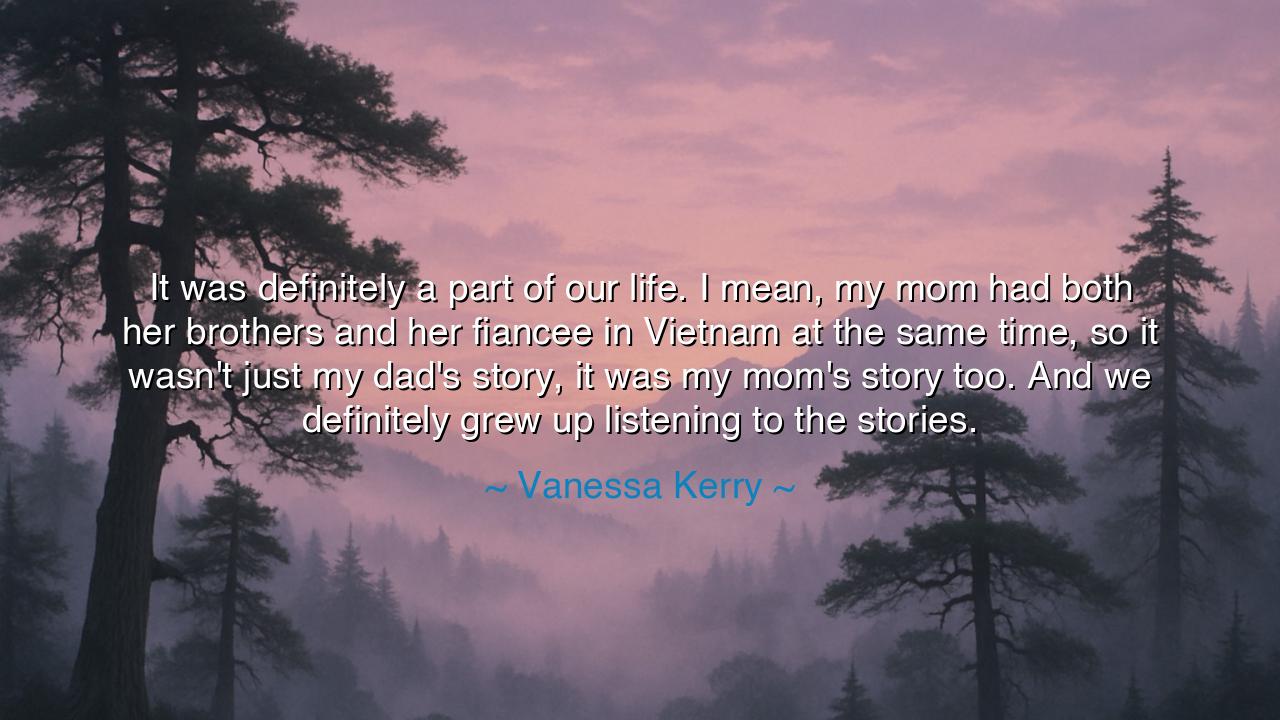
It was definitely a part of our life. I mean, my mom had both her
It was definitely a part of our life. I mean, my mom had both her brothers and her fiancee in Vietnam at the same time, so it wasn't just my dad's story, it was my mom's story too. And we definitely grew up listening to the stories.






Hear, O listeners of memory and lineage, the words of Vanessa Kerry, daughter of the soldier and statesman John Kerry, who speaks not only of war but of inheritance: “It was definitely a part of our life. I mean, my mom had both her brothers and her fiancé in Vietnam at the same time, so it wasn’t just my dad’s story, it was my mom’s story too. And we definitely grew up listening to the stories.” Within this remembrance lies the deep truth that war does not belong to the battlefield alone—it belongs also to the hearth, the family, and the generations who live with its echoes. Hers is a meditation on shared sacrifice, on how history seeps quietly into the blood of those who come after.
The origin of this quote lies in the real experiences of the Kerry family, shaped by the turbulent years of the Vietnam War, a conflict that scarred not just nations but the hearts of countless families. John Kerry served as a naval officer and came home to become a voice against the war he had witnessed. Yet Vanessa’s words remind us that while history remembers the men who fought, there were women who bore unseen burdens—mothers, sisters, lovers, and daughters, whose lives were shaped by fear, waiting, and endurance. Her mother, too, lived through the war not as a soldier but as a guardian of those who went. In this way, Vanessa speaks for all those whose strength is measured not by medals, but by memory.
Her reflection touches upon a truth that the ancients well understood: that the consequences of war reach beyond the battlefield. The poet Homer wrote of the mothers of Troy who mourned not only the fallen, but the years stolen from their sons. And centuries later, the same pattern repeats. The battles end, the guns fall silent, yet the war continues within the stories passed down—stories told at kitchen tables, whispered in prayers, or etched in silence upon the faces of those who lived through it. Vanessa Kerry’s words carry that inheritance, the understanding that every child of a soldier inherits not only pride but also pain.
When she says, “it wasn’t just my dad’s story, it was my mom’s story too,” she speaks to the unity of experience between the battlefield and the homefront. For every man who fights, there are those who wait, those who worry, those who hold together what remains. Their courage is quieter, yet no less sacred. Consider the wives and mothers of World War II, who built nations while their husbands fought abroad, or the families of the Vietnam era, who faced not only loss but public division and moral turmoil. Vanessa’s words pay homage to that often-forgotten heroism—the courage to endure what one cannot control.
There is also, within her reflection, a profound meditation on the power of storytelling. “We definitely grew up listening to the stories,” she says, and in that sentence lives the torch of remembrance. Through stories, wounds are given voice, and the lessons of one generation are carried to the next. It is how pain becomes wisdom, how tragedy becomes teaching. In every civilization, the elders have told their stories to the young not to burden them, but to prepare them—to teach them empathy, resilience, and gratitude for peace. Vanessa’s family stories were not just history lessons; they were the roots of her own moral compass.
Her words remind us, too, that the duty of remembrance is sacred. To forget the past is to risk repeating it. Each story told is an act of preservation, a way of saying to the future: remember what we paid for your freedom. The sadness she feels is not merely personal—it is universal. Humanity takes too long to understand that peace is not a passive state, but a responsibility. Every story of war carried forward by survivors and children alike is a prayer that such pain need not return.
And thus the lesson of Vanessa Kerry’s reflection is clear: do not let the silence of history swallow the voices of those who lived it. Speak of what came before you. Listen to the stories of your elders. Honor the invisible strength of those who loved while others fought. For in remembering, we preserve not only the past but also our humanity. The next time the world is tempted toward division or violence, may it recall these quiet words of a daughter of war—and remember that every battle scars not only the soldier, but the soul of a family, a nation, and a generation to come.






AAdministratorAdministrator
Welcome, honored guests. Please leave a comment, we will respond soon